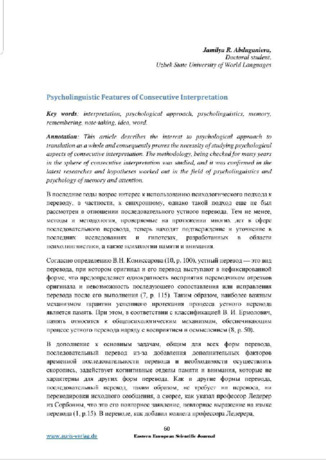







This article describes the interest to psychological approach to translation as a whole and consequently proves the necessity of studying psychological aspects of consecutive interpretation. The methodology, being checked for many years in the sphere of consecutive interpretation was studied, and it was confirmed in the latest researches and hypotheses worked out in the field of psycholinguistics and psychology of memory and attention.

Head of the Department of Theory of Translation of the English Language

This article describes the interest to psychological approach to translation as a whole and consequently proves the necessity of studying psychological aspects of consecutive interpretation. The methodology, being checked for many years in the sphere of consecutive interpretation was studied, and it was confirmed in the latest researches and hypotheses worked out in the field of psycholinguistics and psychology of memory and attention.








Lederer M. La traduction : transcoder ou reexprimer?, 1973: 15.
Matyssek H. Handbuch der Notizentechnikfur Dolmetscher. Groos Edition Julius. 2013; 42.
Pochhacker F. Introducing interpreting studies. London: Routledge, 2004: 100.
Sachs (1967), P.N. Johnson-Laird and R. Stevenson (1970), and G.B. Flores d'Arcais 1974: 205.
Seleskovitch D. (1978). Theories of translation and interpretation. Tehran. 2004; 51.
Alekseeva IS. Professional interpreter training: Manual for oral and written translation for translators and teachers. St. Petersburg, 2008; 185.
Barkhudarov LS. Language and translation: questions of the general and private theory of translation. Moscow, 2008; 115.
Ermolovich VI. Problems of studying the psychological aspects of translation: Translator's Notebook. 1999. Q.24; 50.
Zinovieva LYu. Interaction of operational and long-term memory in mastering a foreign language: Linguistics and linguodidactics, Series: The humanities, 2001, issue 6; 122.
Komissarov W. Modern translation studies. 2002, chapter IV; 100.
Minyar-Beloruchev RK. How to become an interpreter? Moscow, /999; 100.
Mirant GE. Profession: translator. Kiev, 2006: 103.
Robinson I). How to become an interpreter: an introduction to the theory and practice of translation from English. Moscow, 2005; 205.
Svetlichnaya ER. Memory mechanisms providing the process of oral consecutive translation: Language and culture in the era of globalization: a collection of scientific papers on the basis of the first international scientific conference Languages of culture in the era of globalization, in 2 volumes. St. Petersburg. 2013, Issue I. T.2; 97.
Slobin D. Psycholinguistics: Chomsky and psychology: D. Green. Moscow, 2003: 86.